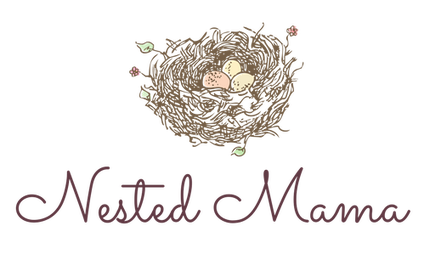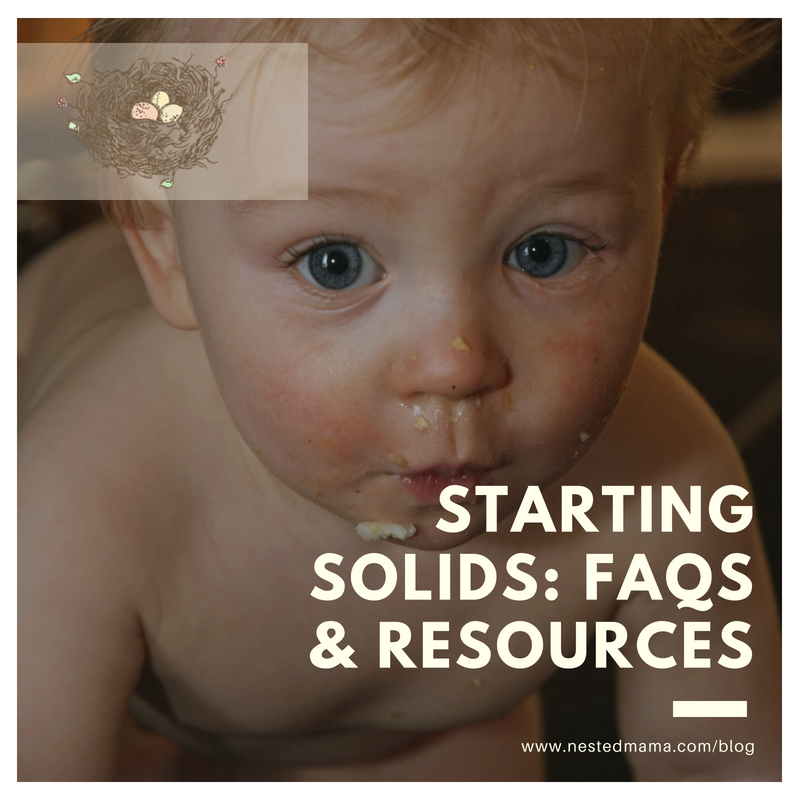|
It happens like this. You’ve had your baby, and life is a whirlwind. You and baby both start to come out of the 4th trimester, life seems a little more predictable, and breastfeeding or bottle feeding or pumping or combo feeding evens out.
You’re finally getting the hang of this motherhood thing - go you! Then you realize what is on the horizon - solids! Even though you just figured out this whole feeding the baby thing, you’ve got to figure it out - again. You’ve got relatives saying I fed my baby solids at X point and he was such a happy baby - you should feed your baby NOW. Or my babies all slept through the night at X weeks and never made a peep - you should feed your baby NOW. It’s overwhelming, for sure. But, don’t worry. I’ve got you. What follows are a whole host of resources to help you navigate these questions. ***Always consult your pediatrician or doctor when in doubt about baby’s growth and development. These resources do not replace medical advice.*** Frequent Concerns About Starting Solids My mother/aunt/grandmother/neighbor/babysitter said they fed solids to their baby at x months. Yes, anyone who parented in a previous generation likely started solids much much earlier than current recommendations. The American Academy of Pediatrics recommends that babies receive breastmilk or formula exclusively until 6 months. My doctor said I could start offering my baby food before 6 months. If your pediatrician recommends a different start (say 4 months), you can ask why they suggest something different than the recommendation given by the American Academy of Pediatrics. Perhaps there is something specific to your baby’s particular situation that should be weighed when assessing risks and benefits to a different plan. Regardless, ask questions until you feel you have the answers you need. My mother/aunt/grandmother/friend/check out lady at the grocery store says solids will help my breastfed baby sleep through the night. Breast milk is the most bioavailable food for your baby - that does mean it is digested quickly. That said, babies wake for all kinds of reasons - teething, reassurance, thirst, hunger, discomfort, developmental changes, and so forth. The answer on sleep and solids, according to research is no - this is not a magic button for longer stretches of baby sleep. Instead, know that night waking is developmentally normal and baby will sleep longer without a feed or reassurance when he or she is ready. If you are looking for a holistic approach to family sleep, you can read more about Nested Mama Infant Sleep Education here. My baby nurses frequently - should I start solids to stretch out feedings? Even after starting solids, breastmilk or formula should remain your baby’s primary source of nutrition. Your baby may nurse as frequently (or even more frequently when going through growth spurts, teething, or illness) even after starting solids. Eating is a new skill, and offering breast milk before solids will make sure that the transition is gradual and baby’s nutritional needs are met throughout that transition. So and so told me that I have to start feeding baby cereal to my baby now. As with starting solids earlier, past generations began feeding baby solids with cereal. Some still advocate this practice because it is fortified with iron. Formula is also fortified with iron. If you are wondering if your breastfed baby should start with cereal because of concern for iron, here is a great resource from Kellymom. More recently, many suggest you not feed baby cereal as it isn’t particularly nutrient dense, and offering other iron rich foods is always an option. Do I have to introduce solids in specific order to prevent allergies? The most recent recommendations from the AAP suggest that limiting certain allergens should be done only if there is a family history of allergies. If this is not the case for your family, common allergen foods are fine to introduce post 6 months and signs of readiness. Honey, however, should be avoided until after age 1 because of possible bacteria. If you have any concerns about specific foods, allergies, and your family, it is best to consult with your doctor. I hear some people talk about baby self-feeding or baby-led weaning (BLW). What does that mean? For the past several generations, it has been commonplace to introduce baby to solid food by offering pureed food that is then spooned into baby’s mouth without requiring chewing. More recently, an approach termed baby-led weaning has become a prominent alternative to feeding purees. With BLW, you begin solids when baby meets certain signs of readiness and offer appropriately sized, soft foods. While starting with purees focuses on baby eating before learning to chew, BLW advocates babies work on chewing, mashing, holding, squishing, spitting, and the intricate dance of mouth and tongue muscles first, without stress on how much they actually consume. With breastmilk or formula still the main source of nutrition in the first year, BLW allows for a gradual, child-led transition into solids. Advocates of this approach highlight that their babies enjoy a wide variety of tastes and textures from the start, and it makes for easier meals because baby eats what you eat (with some mindfulness to size and softness of food) from the start. I’m interested in BLW, but I’m terrified my baby will choke. It is important to note that babies can choke on both purees and table foods. When deciding if BLW is the right way to offer solids for your family, it may be helpful to explore the difference between choking and gagging. Gagging occurs when a piece of food triggers a reflex - in babies, that reflex is triggered more forward in the mouth than adults. Gagging is a normal part of exploring food and doesn’t indicate choking is occuring. You can learn more about the difference between the two here. Ultimately, go with the approach to solids that works best for you family - trust your gut! 6/20/2018 06:15:26 am
Babies starting on solids only eat about 1 tablespoon TOTAL for the day! I don't understand the rush. Comments are closed.
|
AuthorJohanna received a Ph.D. in English in 2014. Now a postpartum doula and educator of childbirth, breastfeeding, and infant sleep, she blogs about pregnancy, birth, postpartum, and parenting. Archives
February 2021
Categories
All
|
Serving Iowa City, Cedar Rapids, and surrounding Corridor communities
Copyright © 2018



 RSS Feed
RSS Feed